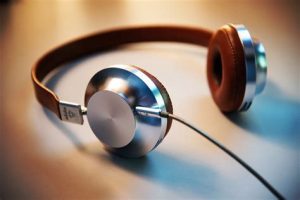Audiobooks. Do they really count as reading?

This discussion is presented (of course) in audio form.
The audio file reviews: the history of audiobooks; reviews primary research regarding the use of audiobooks by a variety of groups; and discusses the narrow question, if audiobooks can successfully replace traditional books in certain high school classes?
References cited in the audio file and used in the research of this podcast are set out below. The references are annotated to provide context to the author and a brief summary of the import or content of each reference.
References [with annotations]
Baskin, B. H., & Harris, K. (1995). Heard any good books lately? The case for audiobooks in the secondary classroom. Journal of Reading, 38(5), 372-376. [Discusses the value of audiobooks in classrooms including: better understanding of stories in exotic locales, the use of trained actors for accents, phrasing and emphasis and ability to understand new dialects more easily].
CBC Radio, (2017, January 5). How the audiobook went from a resource for the blind to a popular form of story telling. CBC. http://www.cbc.ca/radio/q/schedule-for-thursday-january-5-2017-1.3919997/how-the-audiobook-went-from-a-resource-for-the-blind-to-a-popular-form-of-storytelling-1.3920008. [The CBC article reviews the book by Matthew Rubery entitled The Untold Story of the Talking book].
Chang, A. C. S. (2011). The Effect of Reading While Listening to Audiobooks: Listening Fluency and Vocabulary Gain. Asian Journal of English Language Teaching, 21. https://www.dyslexicadvantage.org/wp-content/uploads/2016/10/Reading-While-Listening.pdf. [Primary research study that found reading while listening for ESL students results in improved fluency and vocabulary].
Dahl, M. (2016, August 10). To your brain, listening to a book is pretty much the same as reading it. . https://www.thecut.com/2016/08/listening-to-a-book-instead-of-reading-isnt-cheating.html. [The article cites Daniel Willingham (see below) who surmises that “audiobooks are not cheating”). Discusses decoding and comprehension.]
Daniel, D. B., & Woody, W. D. (2010). They Hear, but Do Not Listen: Retention for Podcasted Material in a Classroom Context. Teaching of Psychology, 37(3), 199–203. https://doi.org/10.1080/00986283.2010.488542https://journals-sagepub-com.ezproxy.library.ubc.ca/doi/abs/10.1080/00986283.2010.488542 [Peer reviewed primary research study. The conclusion was that students using podcasts did significantly worse on a quiz immediately after the reading/listening].
Edison, T. (1927, August 12). “Mary had a little lamb”. https://archive.org/details/EDIS-SCD-02#:~:text=Mary%20had%20a%20little%20lamb%20Spoken%20by%3A%20Thomas,Jersey%20Recording%20taken%20from%20Movietone%20Production%20news%20film. [Thomas Edison demonstrates how in 1877 he made the first record on tin foil. The original 1877 recording was not saved].
Frey, N., & Fisher, D. (2006). ‘You Got More of These? Re-engaging Adolescent Readers and Writers with Meaningful Texts. RHI: An Annual Magazine for Educators, 1(1), 7-12.
Heid, M. (2018, September 6). “Are audiobooks as good for you as reading? Here’s what experts say. Time.com. https://time.com/5388681/audiobooks-reading-books/ [Cites the research study by Rogowsy et al (2016)].
Marchetti, E., & Valente, A. (2018). Interactivity and multimodality in language learning: the untapped potential of audiobooks. Universal Access in the Information Society, 17(2), 257-274. https://link-springer-com.ezproxy.library.ubc.ca/content/pdf/10.1007/s10209-017-0549-5.pdf. [Peer reviewed primary research. Next step thinking about the integration of audiobooks into the classroom including how audiobooks can be made into an interactive medium – adding to the text for learning purposes].
Moore, J., & Cahill, M. (2016). Audiobooks: Legitimate” Reading” Material for Adolescents?. School Library Research, 19. https://files.eric.ed.gov/fulltext/EJ1120838.pdf [Peer reviewed secondary research article that considers the use of audiobooks by teens with learning disabilities and teens with typical patterns of development.].
Rego Barry, R. (2016, November 16). Is audio really the future of the book? JSTOR Daily. https://daily.jstor.org/the-future-of-the-book-is-audio/. [This article reviews Rubery’s book (see below) and comments on Wolfson’s 2008 observations on how audiobooks teach critical listening, improve vocabulary, increase comprehension and appreciation of the written words, especially for “reluctant readers – including ESL’ and those with visual impairments].
Rogowsky, B. A., Calhoun, B. M., & Tallal, P. (2016). Does modality matter? The effects of reading, listening, and dual modality on comprehension. SAGE Open, 6(3), 2158244016669550. https://journals.sagepub.com/doi/pdf/10.1177/2158244016669550. [Peer reviewed primary research study regarding the affect on comprehension of the input modality – audiobook, e-book or dual modality (listening while reading)].
Rubery, M. (2016). The untold story of the talking book. Harvard University Press. [Rubery is Professor of Modern Literature at Queen Mary School of London (UK). The book reviews the history of audiobooks. Was available through the City of Toronto public library system].
Waite, S. (2018). Embracing Audiobooks as an Effective Educational Tool. https://digitalcommons.brockport.edu/ehd_theses/1218/ [Thesis for MSEd program at SUNY Brockport. A comprehensive review of the use and efficacy of audiobooks].
Willingham, D. (2016). Is listening to an audio book cheating. Daniel Willingham-Science and Education. http://www.danielwillingham.com/daniel-willingham-science-and-education-blog/is-listening-to-an-audio-book-cheating#:~:text=Listening%20to%20an%20audio%20book%20might%20be%20considered,Disneyland%20and%20saying%20%E2%80%9Cyou%20took%20a%20bus%20here%3F [Willingham holds a Ph.D in Cognitive Psychology from Harvard University and is a Professor of Psychology at the University of Virginia. Willingham posits that one’s mind mostly does the same thing when reading and listening. Discussion of decoding and comprehension].
Willingham, D. (2017). The reading mind. A cognitive approach to understanding how the mind reads. Jossey-Bass. [Willingham holds a Ph.D in Cognitive Psychology from Harvard University and is a Professor of Psychology at the University of Virginia. The written book was borrowed from the City of Toronto public library system.
Wolfson, G. (2008). Using audiobooks to meet the needs of adolescent readers. American Secondary Education, 105-114. [Wolfson is an Associate Professor in the Education Department of Iona College. The article discusses the use of audiobooks with adolescent readers, in particular to improve fluency, expand vocabulary and increase motivation with books. Opportunities for audiobooks include for students with special needs.]
Woo, A. (2020, August 9). Canada’s guidelines on reopening schools recommend masks for students aged 10 and up. Globe and Mail. Toronto. https://www.theglobeandmail.com/canada/article-masks-for-students-aged-10-and-up-recommended-by-canadas-public/. [This article is included not for the content but to demonstrate that the Globe and Mail has added an audio open for stories. Readers can read or listen to the story – with a speed listening option].